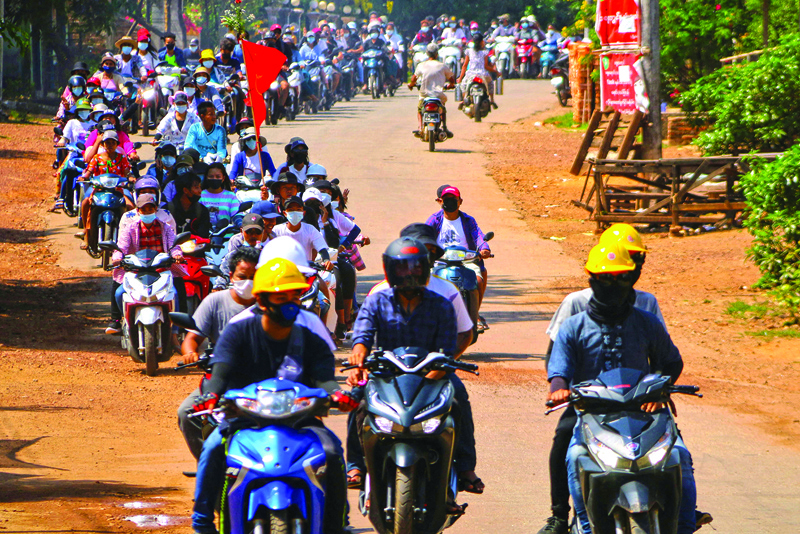 This handout photo taken and released by Dawei Watch yesterday shows protesters taking part in a demonstration against the military coup in Dawei. - AFP
This handout photo taken and released by Dawei Watch yesterday shows protesters taking part in a demonstration against the military coup in Dawei. - AFP
YANGON: A group representing Myanmar's ousted civilian government said yesterday it has gathered 180,000 pieces of evidence showing rights abuses by the junta including torture and extrajudicial killings. The country has been in turmoil since the army deposed civilian leader Aung San Suu Kyi on February 1, with nearly 600 people killed in a crackdown on anti-coup protests.
The Committee for Representing Pyidaungsu Hluttaw (CRPH) -- a group of MPs from Suu Kyi's party-said its lawyers would meet UN investigators to discuss alleged atrocities committed by the junta. "CRPH has received 180,000 items of evidence. This evidence shows widescale abuses of human rights by the military," the group said in a statement. They include more than 540 extrajudicial executions, 10 deaths of prisoners in custody, torture, illegal detentions and disproportionate use of force against peaceful protests, the statement said.
Demonstrations calling for the return of democracy and the release of Suu Kyi from detention have rocked Myanmar almost daily since the coup. Civil servants, doctors and other key workers have downed tools as part of a civil disobedience movement aimed at preventing the military from running the country. In response, the security forces have used rubber bullets and live rounds to break up rallies and detained thousands of activists, some in night raids.
The Assistance Association for Political Prisoners (AAPP), a local monitoring group, says 581 civilians have been killed in the crackdown and more than 2,700 arrested. Nearly 50 of the dead were children. With many protest supporters and NLD activists now in hiding to escape arrest, the junta is increasingly taking their family members hostage, according to AAPP.
UN meeting
International powers have voiced anger and dismay at the junta's brutal approach, and imposed sanctions on key officials. But while the UN Security Council has condemned civilian deaths, it has stopped short of considering sanctions. Both China and Russia have come out against sanctions, arguing they risked making the situation worse. And so far, the diplomatic pressure appears to be having little effect, as deaths and detentions continue every day. The CRPH, which claims the right to speak for the country instead of the junta, said its lawyers are to meet the UN's Independent Investigative Mechanism for Myanmar yesterday.
"This meeting is intended to discuss the modalities of dialogue and cooperation between Myanmar (acting through CRPH) and the IIMM in relation to the atrocities committed by the military," the statement said, without giving details of when and where the meeting would take place. Rights group Amnesty International last month reported that the junta was using battlefield weapons on unarmed protestors and carrying out premeditated killings orchestrated by their commanding officers.
The growing bloodshed has prompted warnings that Myanmar could slide into broader civil conflict, particularly after 10 ethnic rebel armies came out in support of the protest movement. As well as breaking up protests and making arrests, the security forces have also sought to shut off news of the crisis. Internet access has been throttled, and independent media outlets raided and shut down.
In response, some activists have started a daily two-page newsletter called "Voice of Spring", rounding up independent media reports and publishing on Twitter. The military insists that it is responding proportionately to what it says are violent, armed protesters. It has defended seizing power, pointing to allegations of voting fraud in the November election which Suu Kyi's party won comfortably. - AFP
.jpg)



